Kari McGregor weighs in on the false promises of a flaccid agreement from COP21 that leaves behind the innocent and most vulnerable.
Paris was a world-first: all of the major emitters huddled around the negotiating table, ready to write the script on a new era of climate action.
No absences. No excuses.
It took 21 years of bureaucratic wrangling to transcend tactical boycotts and get everyone to the starting blocks. If nothing else, the United Nations Framework Convention on Climate Change (UNFCCC) 21st Conference of Parties (COP21) can take credit for a full house.
Talks have often been fraught with tension: negotiations at COP6 at The Hague in 2000 broke down and talks were rescheduled for 2001 in Bonn; COP15 in Copenhagen in 2009 collapsed in disarray without agreement.
Even when agreements are reached they are hardly ambitious. The 1997 Kyoto Protocol is held up as the gold standard in climate mitigation. The bar is low: Kyoto only covered 15 per cent of emissions.
Kyoto’s main achievement was global endorsement of a form of accounting trickery known as emissions trading.
It was also at Kyoto that the arbitrarily agreed baseline for measuring emissions was pitched at 1990. Since 1990, global greenhouse gas emissions have risen by more than 60 per cent.
Paris was hyped to be the start of a hopeful new era of climate negotiations.
Paris in perspective
As a member of the Climate Action Network Australia (CANA) civil society delegation to COP21, Less Meat Less Heat CEO Mark Pershin was privileged with a fly on the wall perspective.
Pershin flew to Paris high on hope, and left with the bitter aftertaste of disillusion.
After the initial fanfare and flurry of grandiose rhetoric was over, the world leaders jetted home, leaving the nitty-gritty of negotiations to bureaucrats and diplomats.
In a process more reminiscent of editorial pedantry than sustainability strategy, the delegates quibbled for two weeks over the language of the pre-written agreement text. Decisions came down to which phrases get relegated to brackets, and which ones get omitted entirely.
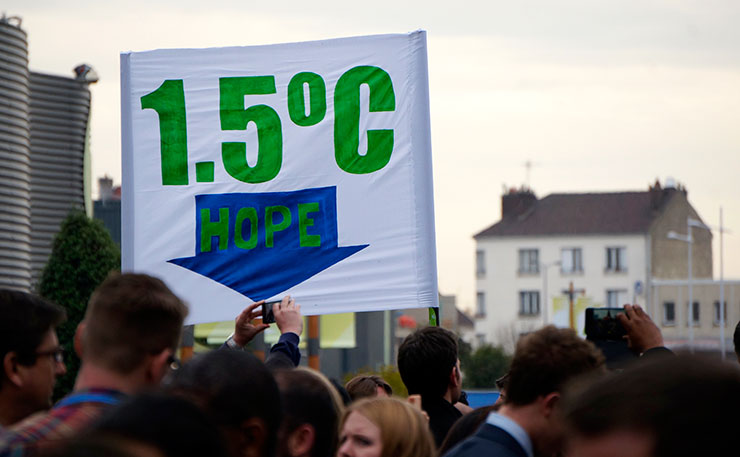
Outside the negotiating room, the corridors of power were saturated with gossip – gossip that had a way of creeping into strategy. Pershin overheard comments such as “India said x, which is why we must say y,” and “I heard that the LDCs are pushing for 1.5, so perhaps we could do this.”
Each team of delegates was bound by its own set of ‘red lines’ – make-or-break areas of negotiation serving their country’s agenda. The red lines of the major emitters set the parameters for the process.
COP decisions are made by consensus – a reassuring process when taken at face value, yet wide open to abuse and bullying in practice. A single country is able to block negotiations by refusing to dialogue on points that fall below their own red lines.
Given this effective veto power, one can only expect defensive response to clauses that threaten a nation’s main source of income – witness Saudi Arabia on the topic of oil.
Strength lies in numbers for those who lack economic clout. Many of the world’s most vulnerable developing countries formed alliances such as the Least Developed Countries (LDCs) coalition and the Climate Vulnerability Forum (CVF). Collectively they represent over 100 countries, one billion people, and three per cent of historical emissions.
The leaders and negotiating teams from these countries get a seat at the table, but they do not get a voice. Transcripts of the negotiations demonstrate a disconcerting asymmetry: what gets said in the negotiating room is not well reflected in the final agreement when voiced by economic lightweights.
The hope and hype of Paris: dashed on the rocks of gossip, bullying, and power-play.
Theatrics and evasion tactics
Despite playing no role in the negotiations, world leaders hogged the spotlight with their grandiose speeches and staged photo opportunities. But it is what happens outside the spotlight that determines our fate.
Historically responsible for over half of global emissions, the United States’ political clout scored them assurances that the COP21 agreement would not be legally binding. Holding the process hostage, the artful dodgers traded their attendance for absolution of responsibility.
Without a legally binding agreement one could be forgiven for wondering why anyone bothered turning up to negotiate, or why anyone would bother derailing the process. But theatre needs a full cast of characters.
Two weeks of quibbling over the wording of a non-binding agreement gave the floor to heroes, villains, and damsels in distress as they recited the lines to an all-too-familiar script.
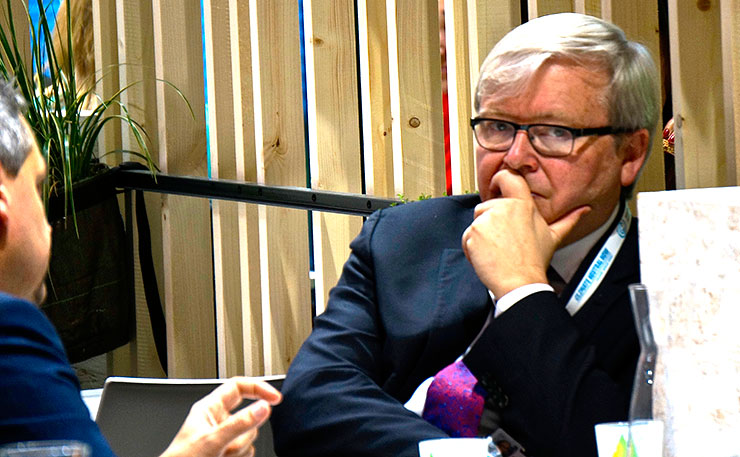
Delegates from several countries held meetings in public spaces without seating room, fearing that their offices were bugged by the United States’ National Security Agency.
The issue of loss and damage proved a bone of contention, with the United States and European Union delegations placing pressure on other parties to play it down. They also hedged their bets by pressuring developing countries to contribute to the loss and damage fund of $100 billion per year.
Contrary to popular misunderstanding, loss and damage refers only in part to compensation; its key focus is on emergency relief and planned relocation.
The fund is also intended to cover the transition to renewable energy.
Although a tall order for developing economies to contribute, the $100 billion represents a pittance in terms of the trillions required. India alone could swallow up the $100 billion and still need more.
The COP21 agreement also sought to hedge requirements further still. Instead of stipulating emissions targets and timelines, the agreement allows for Intended Nationally Determined Contributions (INDCs), which are exactly what they sound like: intended = not binding; nationally determined = not imposed; and contributions = not responsibilities.
In sum, the INDCs are basically optional, and vague, which is never a good starting point if you’re serious about addressing a problem.
Climate Interactive estimates that, if implemented, the trajectory implied by the INDCs is toward 3.5 degrees of warming by the end of the century.
Emissions and omissions
Crafted with the stated intention of tackling emissions, the COP21 agreement is light on detail and heavy on omissions. Sources of fossil fuels emissions are not named; neither are the causes of deforestation.
And no mention is made of a growing population with increasing consumer demands for emissions-intensive products, such as personal cars and red meat.
Such manufactured wants, if accounted for, indicate a trajectory toward six degrees of warming, according to the Chatham House Global Calculator.
Setting meaningful targets and timelines rests upon consideration of the sources of the problem. An agreement that glosses over these is window dressing, not substance.
A meaningful agreement would arguably include reference to both the extraction and burning of fossil fuels, and the primary causes of deforestation – livestock agriculture being by far the biggest.
The COP21 agreement fails to acknowledge the obvious connections between energy supply and demand, industry and economic growth, consumption and destruction.
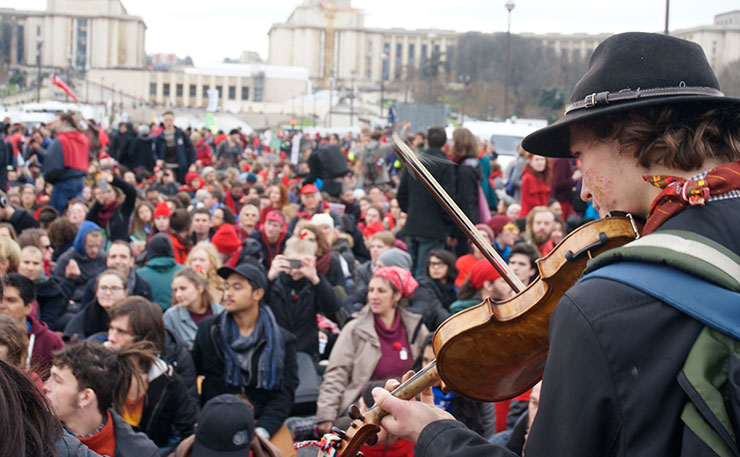
Even outside the formal negotiating rooms evasion of inconvenient truths prevailed. When questioned by Pershin on the impact of livestock-related emissions, the USDA, WHO, Carbon Tracker, and even the climate movement’s most famous vegan (Al Gore) made their red lines clear. Their answers focused on managing supply; reducing demand was taboo.
The underlying message is this: the perpetual growth model of our global economic system is not up for negotiation. Hence we must not question our unsustainable consumer demand.
Beyond the red lines
His fly on-the-wall observations dispatched any hope Pershin had of COP21 paving a low emissions pathway. He set to work engaging the delegations of the most vulnerable countries.
Taking the time to listen to those whose contributions at the negotiating table were falling on selectively deaf ears proved a therapeutic counterbalance.
Delegates began to open up about their frustrations. Representatives from Indonesia, the Philippines, Thailand, India, Liberia, Kiribati, Cameroon and many more of the world’s most vulnerable countries ventured into topics that fell below the red lines of the world’s economic heavyweights.
Liberia is one of the world’s most vulnerable nations, yet few understand the connections between climate change, drought, and crop failure. Many don’t even understand what climate change is, according to Liberian delegate Fester Saydee, who emphasised the urgent need for education.
A growing number of Liberians face a Faustian bargain to put food on the table for their families, with logging the only option for many. Most are unaware of the industry’s impacts on the water cycle, exacerbating the droughts already driven to extremes by climate change.
The people of Thailand face a Faustian bargain of their own. With their options down to the lights going off and returning to coal-fired energy, Thais chose the latter as the price of gas ricocheted from speculation and market shocks.
Assistance with clean energy finance could catapult Thailand into the renewable era, but instead they are forced to make matters worse.
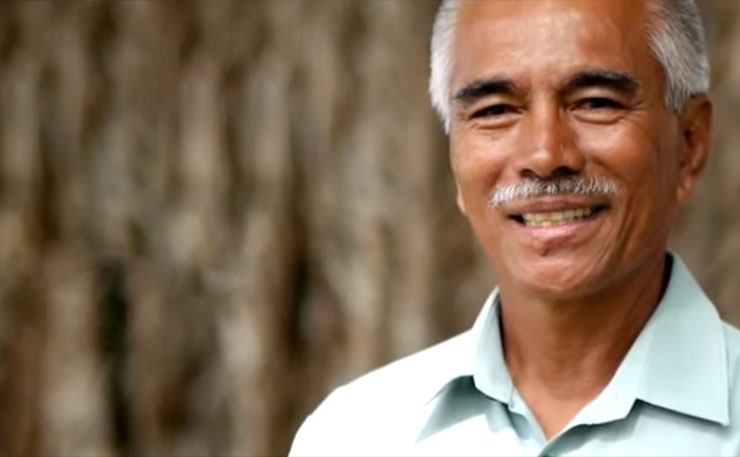
Pershin was hardest hit by stories from the low-lying tropical island paradise of Kiribati. The islanders’ rich culture, strong connection to their land, and their hope in the COP21 negotiations amount to nothing as the sea level rises.
Failure for Kiribati came in the form of the agreement many declared a success; for Kiribati it spells forced eviction from their lost island paradise.
Surrendering to failure, Kiribati youth delegate Ininterunga Rae Bainteiti whispered his admission of fear, unheard by the world.
The COP-out we can’t afford
After 21 conferences of parties, and 23 years of climate talks, it’s time to concede defeat: we’re not reducing emissions. We’re dishing out ‘get out of jail free’ cards to the world’s biggest polluters, and poison challises to the world’s poorest and most vulnerable.
In the process we create the illusion that the problem is under control, that consumers can keep calm and carry on with business as usual.
Pretending we’re solving the problem with quibbles over the wording of a non-binding document is a farcical distraction, far removed from what we have been led to believe about COP. It’s a cop-out with severe consequences.
Pershin says he went to Paris with hope, and lost it amid the fray of farce, gaining rage and frustration in its wake. But he learned a crucial lesson: what is left once hope is gone is not despair – it is determination, a drive for action.
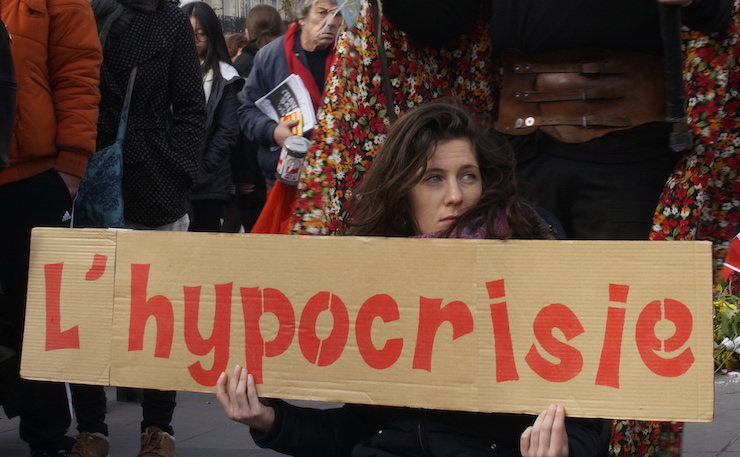
Pershin left Paris determined to drive the cultural and behavior change we need to avoid climate catastrophe. With the launch of Less Meat Less Heat, Pershin and his team aim to harness grassroots momentum. Seeking to inform, inspire and empower real-world changes, Less Meat Less Heat dishes up a fair portion of responsibility onto plates in every household.
Combating the complexity of climate change isn’t simple, but some of the choices we make are.
We can choose to consume less, and waste less. We can choose climate-sensitive small weekly servings of emissions-intensive red meats like beef and lamb while loading up on fresh, locally sourced produce.
Pershin’s take-home lesson from COP21 is that the waiting game is up. We cannot afford to wait for politicians and bureaucrats to agree on their agendas, for market forces to price out fossil fuels in favor of renewables, or for technological innovation to save the day.
We can, at any moment, choose to adopt a one-planet lifestyle, reducing demand for emissions-intensive practices. Without demand, supply will also stall, and grassroots change will creep up through the cracks of our broken system.
We can make the choice to live lightly on the planet, leaving only small footprints.
We can, and we must, because surrendering to a broken process and empty promises is a COP-out we can’t afford.
Donate To New Matilda
New Matilda is a small, independent media outlet. We survive through reader contributions, and never losing a lawsuit. If you got something from this article, giving something back helps us to continue speaking truth to power. Every little bit counts.





